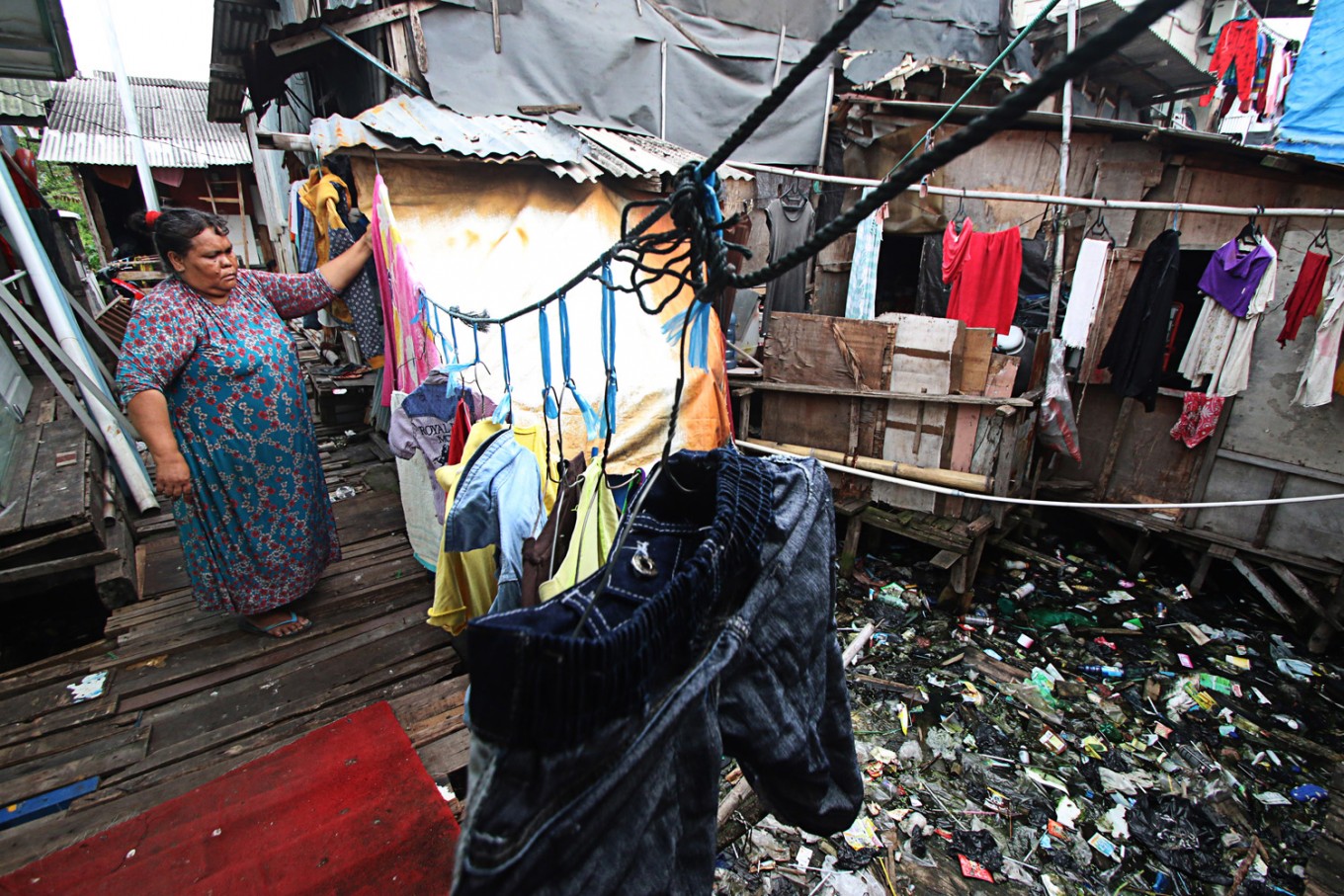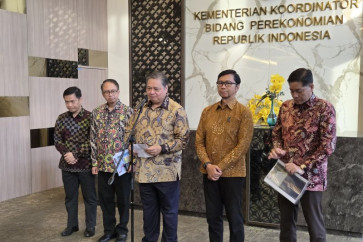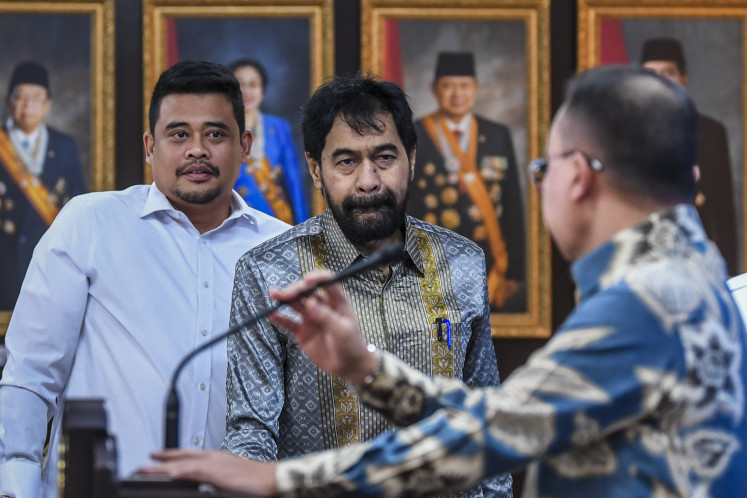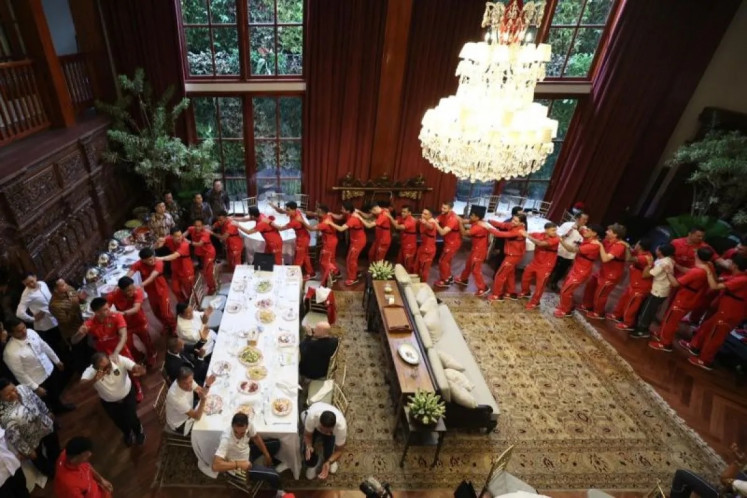Popular Reads
Top Results
Can't find what you're looking for?
View all search resultsPopular Reads
Top Results
Can't find what you're looking for?
View all search resultsKampungs off er answer to Jakarta slum issues
Several slum kampungs in northern Jakarta have adopted a collective housing model and would like the government to know of their success.
Change text size
Gift Premium Articles
to Anyone

S
everal slum kampungs in northern Jakarta have adopted a collective-housing model and would like the government to know of their success.
Representatives from the kampungs Lodan, Tongkol, Kerapu, Marlina and Akuarium showed that in communities where residents actively participate in remodeling their communal-living space, they can tackle the different challenges they face.
They made their case on Monday during a tour arranged by Rujak Center for Urban Studies that the collective-housing model should be the solution for Jakarta’s slum problems, instead of the forced-relocation method that city administration has employed time and again.
“The government is of the opinion that reforming the slums is an impossible task with forced relocation to rusun [low-cost apartments] being the only solution,” said Kampung Marlina resident Eni.
“We want to show to the government that we, the residents of those slums, are capable of reforming our homes.”
With overhanging second floors completely covering the narrow alley below, Kampung Marlina was a victim of unchecked urbanization.
But as several house remodels have been completed, bright spots have begun to show in the Marlina alley that, according to Eni, has not seen a ray of sunshine in years.
Each remodel is designed to accommodate the specific needs of each resident, with architects from Rujak providing assistance.
“I have two kids, so I need three bedrooms. Even though a section of the original house was cut, I didn’t lose any space as they’ve been moved to a new third floor,” said Eni.
Cooperative model
Initial funding for the remodels was provided by the National Alms Agency (Baznas) with subsequent financials handled by the Maju Bersama Marlina Cooperative.
“Residents have to pay 10 percent of the budget plan upfront. Baznas provides Rp 10 million [US$635] aid for each house, with the cooperative handling the rest,” said Eni.
The residents, Eni adds, will then have to pay back the cooperative through zero-interest monthly installments, with the amount and credit period dependent on the financial capability of each resident.
Money gathered by the cooperative will then be used to finance the next remodel and so on.
This same approach can also be seen in the “vertical village” of Kampung Akuarium, where the Bangkit Mandiri Akuarium Cooperative essentially acts as the building manager.
As management, the cooperative has its own standard operating procedure (SOP) for occupancy, security and maintenance, drafted with assistance from the Jakarta Property Institute.
But as a community-run entity, Kampung Akuarium’s SOP differs from other low-cost apartments managed by the government as they employ a more democratic approach.
“The maintenance costs and the no-shoes rule inside the building were all discussed together beforehand [with the residents],” said cooperative head Dharma Diani.
However, she admits that getting the more-than-200 families in Kampung Akuarium to agree on certain subjects can be hard. “We always outline our reasoning when deciding on a regulation. The discussion sometimes gets heated, but we always try to reduce our egos and avoid conflict,” explains Dharma.
Security of tenure
Aside from internally managing the goings-on within Kampung Akuarium, the cooperative acts as the community’s representative in discussion with the government. “For the time being, the cooperative has a five-year lease on the building from the Jakarta administration,” said Rujak executive director Elisa Sutanudjaja.
But the cooperative is also currently engaged in discussion on acquiring a right-to-use (HGB) permit for the building through a grant from the Jakarta administration.
To do that, the city requires the cooperative to prove their financial and management capability by amassing Rp 1 billion (US$63,552) in the next five years and attending building-maintenance classes offered by the government.
For the kampung residents whose residency status is often up in the air, obtaining a security of tenure has been a long-held dream.
“We have to show the government that we are open to collaborating and all we’re looking for is a security of tenure,” said Dharma.
---
A cooperative is a type of business entity jointly owned and managed by its own members with capital also provided by its members. Taking its name from the word cooperation, a cooperative prioritizes kinship in its management and is generally more democratic compared to typical enterprises.
In Indonesia, cooperatives can be seen as the counterpart to the spirit of gotong-royong (mutual cooperation). While the latter is more abstract and concerns the social mores of Indonesians, the former is more practical and has a direct impact on livelihood.
As with typical business entities, cooperatives may provide various goods, services or any combination thereof. Cooperatives can function as a retail company, service providers, a supplier of raw materials or even provide loans for its members.
However, because cooperatives are typically meant to provide those goods and services to its members with profit not a priority, prices are typically lower compared to other types of business entities.
In the case of Maju Bersama Marlina Cooperative, the cooperative provides home-remodel loans with zero interest, with the cooperative taking an upfront payment amounting to 5 percent of the budget plan for operating costs instead.
By comparison, banks give out property or home-ownership loans with sizable interest rates, which amount to more money over time.
Compared to banks, where pay slips or other guarantees are typically required to take out sizable loans, cooperatives tend to be much more flexible as well.
With many members from low-income communities working in informal sectors, cooperatives give them access to financial instruments they might otherwise not have access to.









